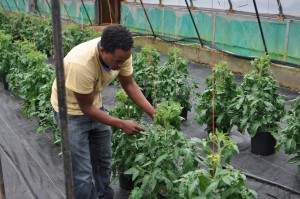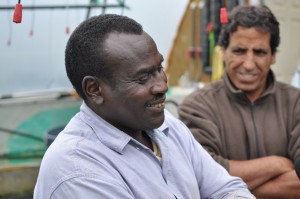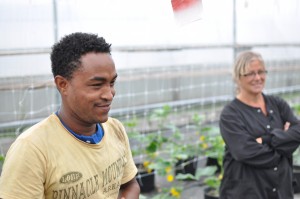Businesses in Anchorage have a tough time finding entry level employees. For some employers, the solution is hiring refugees — individuals who fled violence or persecution in their home countries and are trying to enter into life in the United States. Catholic Social Services uses money from the Office of Refugee Resettlement to help run programs that connect refugees with employers. However, Congress has voted to redirect $94 million from that program to help unaccompanied children who are arriving in the United States. President Obama will decide whether or not the money should be taken from the program soon. It could impact CSS’s activities. The non-profit recently gave an award to P&M Gardens for their willingness to employ refugees.

Download Audio
Diwt Gerewakl is a short, slight man with a faint beard and springy black curls. He walks between the massive greenhouses of P&M Gardens in Eagle River, where he’s worked for two years.
“Morning first, I finish that house,” he explains in broken English, pointing at a greenhouse where he trains pickler vines to go up plastic mesh. “Then I come into here….”
He enters a greenhouse filled with rows of tomato plants and begins pulling off the extra large leaves. “You need every day check check. Maybe it comes in big — like that — then you come in…see.” He plucks off leaves with expert hands.
Gerewakl has never raised vegetables before or even farmed. Now he’s responsible for tending 40,000 geraniums, 4,000 plant baskets, and 1,500 tomato plants in cages.
He was born in Ethiopia but spent most of his life traveling from country to country in northern Africa. He’s not allowed into Eritrea, where his family is, because of political reasons. So two years ago, when he was 21, he was relocated as a refugee to Alaska and got a job with the gardening company.
He works alongside Issa Ali Abdul, who comes from the Sudan.
Abdul farmed before fleeing his home in Darfur. Through his co-worker, who also speaks Arabic, he explains that in the hot, mountainous area they grew fields of sesame seeds and other foods. He says it’s nothing like working in the greenhouses here, where trays teaming with bright purple pansies grow in plastic houses.

“He says this is Alaska,” translates Simone. “You just have snow. You don’t have nothing.”
But Abdul says he does enjoy his work.
“He’s saying ‘I like working shipping because I bring flower, I put it in truck. and then I sometimes go with truck. I help him go over there and I come back.'”
P&M manager Debbie Bacho, says they both learned the new skills very quickly and now work for her year round, even though she and Abdul have to speak through a translator. She says this year she employed about 20 refugee workers during the growing season. She taught them a few necessary words, like “same,” for matching labels to plants.
“And then a lot of it is just visual. Showing them what needed to be done. I was totally amazed at how fast they could get it done.”
Bacho says she spends time with the refugees helping them with things like getting bank accounts and drivers licenses and applying for PFDs. “Those are the things that you help them do. And in turn they are committed to you to do a good job for their pay. And that’s hard to find in the seasonal world any more. It really is.”
According to CSS, which helps refugees settle into Alaska, on average more than 85 percent of refugees are employed within six months of arriving in the state. Karen Ferguson is the State Refugee Coordinator for the organization. She says her agency works with refugees to help find them jobs.
“What they most desire is to be independent, to be able to take care of their family, to be able to pay the bills. And they are ready to work. They have often been not allowed to work. So it is a very eager workforce. And they most of the time do understand that they are going to start as a dishwasher, or they’re going to start in janitorial, cleaning a hotel room.”
Ferguson says they have a network of businesses who are willing to work through the initial communication struggles to find good employees.

“It’s so exciting when we get that next call that says ‘Okay, we’ll take some more of your refugee candidates.'”
That’s what Bacho did. She’s been employing refugees for four years. She says it’s not always easy to overcome some of the cross-cultural differences and some of her customers make disparaging comments about employing refugees. But she says she doesn’t let it bother her as she’s watching her business grow.
Anne Hillman is the healthy communities editor at Alaska Public Media and a host of Hometown, Alaska. Reach her at ahillman@alaskapublic.org. Read more about Anne here.





